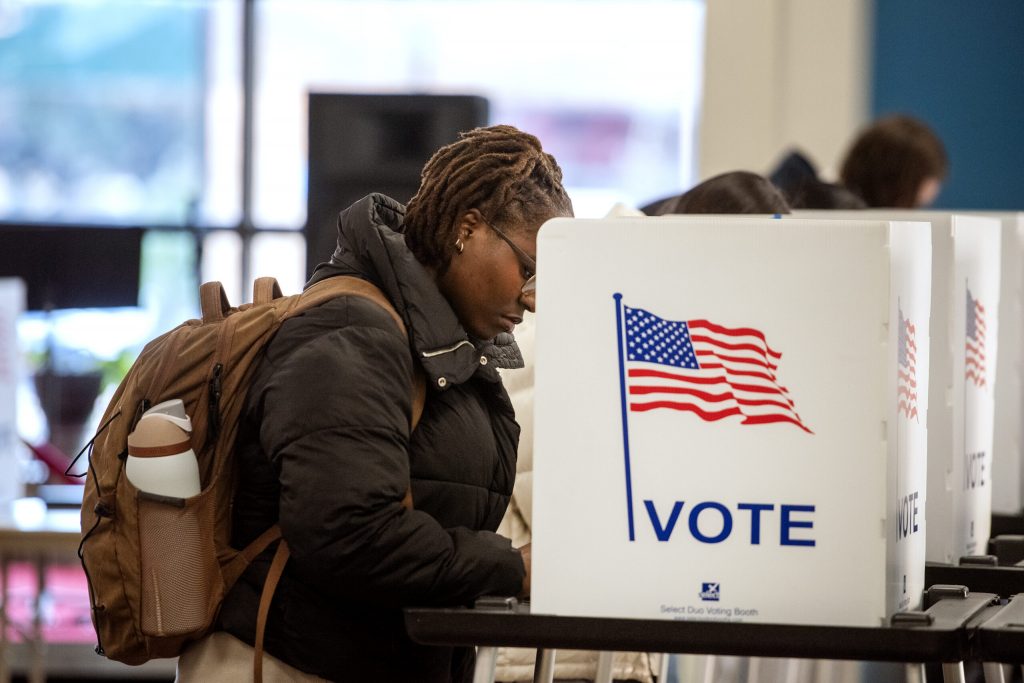Advocates Push Wisconsin to Allow Fusion Voting
Would allow third parties to nominate candidates from two major parties.

Madison residents fill out ballots Tuesday, April 1, 2025, at the Madison Senior Center in Madison, Wis. Angela Major/WPR
A La Crosse-based nonpartisan group called LeaderEthics is working to raise awareness about a concept called fusion voting. The idea is that political candidates can form coalitions of endorsements instead of relying solely on being the candidate of a single party.
Advocates say it could provide Wisconsin voters with more options outside the two major parties, WPR previously reported.
“That means we have different views — views that come from third parties — that are allowed to support like-minded candidates from other parties,” said Lee Rasch, executive director of LeaderEthics. “Essentially, it means that third parties don’t ‘take away’ votes from the major parties, but rather contribute to our involvement and thinking in the electoral process.”
Rasch is part of the group, United Wisconsin, which is suing the Wisconsin Elections Commission to reinstate the practice.
Critics of the practice have offered a different perspective. A Republican Party of Wisconsin spokesperson recently told The Associated Press that fusion voting could result in voters being “manipulated into voting for a major party candidate masquerading as an independent.”
A forum hosted by LeaderEthics and featuring representatives from United Wisconsin is being held Wednesday in La Crosse.
Lee Rasch recently spoke with WPR’s Ezra Wall on “Morning Edition.”
The following has been edited for brevity and clarity.
Ezra Wall: Tell me about fusion voting. It doesn’t happen right now in Wisconsin, but it used to. What’s the history behind the idea?
Lee Rasch: The fusion voting concept actually goes back to the formation of our country. It had substantial use for the first 120 years of our nation’s history. Essentially, it’s pretty simple: It allows third parties or multiple alternative parties to nominate candidates, even if those candidates are members of another political party. When the votes are tallied, it allows those votes to be combined.
EW: There are already lots of political parties in addition to the Democrats and Republicans. How would fusion voting offer something different to voters?
LR: Let’s look at it this way. If we’re bringing candidates forward for a state office election, and a third party is advocating for campaign finance reform, we know there are members of both major parties who support legislative change in that area.
So, if that third party reaches out to an incumbent from the Democratic or Republican Party and nominates that individual, their votes are combined to support a shared goal.
But think of it this way: In our current system with two dominant parties, if a third party runs on any issue, many voters view them as taking away votes from one of the major parties. That creates pressure to remove third-party involvement and direct support to one of the major parties.
EW: You’re part of a group, United Wisconsin, that is suing the Wisconsin Elections Commission to allow fusion voting. What’s the next step in that process?
LR: Well, it’s going to go through the litigation process, which has many steps. It could actually take up to two years.
Our goal is to get interpretations from various levels of the court system, appeal as necessary, and ultimately bring the case to the Wisconsin Supreme Court.
EW: You’re hosting a forum in La Crosse on Wednesday. Who will be participating?
LR: We’re going to have two of the cofounding members of the United Wisconsin board: former Republican State Sen. Dale Schultz and former Dane County Democratic Sheriff David Mahoney. Also joining us will be Kristine Andrews, the executive director of United Wisconsin.
Fusion voting draws renewed attention from Wisconsin advocates was originally published by Wisconsin Public Radio.
If you think stories like this are important, become a member of Urban Milwaukee and help support real, independent journalism. Plus you get some cool added benefits.


















